NO CLOSURE FOR GENOCIDE
Family is how history happens. As Arthur Miller wisely showed in All My Sons, The Gift and The Crucible, change radiates outward. Even, or especially, an immense abomination like the Holocaust can’t be measured in six million dead as powerfully as in one family crushed and confronted by what was, what might have been, and what can never be.
The strength of Barbara Lebow’s 1987 drama is how a tale of two sisters stands for so many others that might have gotten lost in compassion fatigue, organized outrage, guilt-ridden denial, rationalizing relativism, or emotional overkill.
Sensitively staged by Vanessa Stalling for TimeLine Theatre, and galvanized by an indelibly committed six-member ensemble, these two acts deliver a harrowing litany of loss. Still, there’s enough hope to leaven so much suggested sorrow.
With the deceptively innocent title of A Shayna Maidel (“A Pretty Girlâ€), this domestic drama breaks into, and also breaks, the heart with a “before†and “after†that measures all. It’s 1946 on New York’s West Side when sundered loved ones come together. Rose Weiss (superb Bri Sudia) lives in a beautifully furnished, three-room walk-up apartment (splendidly appointed with period perfection by Collette Pollard).
Visiting her like the wrath of God is her sternly strict and implacably religious, 70-year-old father Mordechai (Charles Stransky, a force field of emotion). Because they never endured the organized violence of the Shoah, the survivor guilt of this dad and daughter remains abstract but consequential. (The edict to “Never forget,†of course, depends on what you remember.)
Pointedly not here is Rose’s older sister Lusia (an achingly anguished Emily Berman) and her devoted mother (Carin Schapiro Sikaitis). They’re gone, possibly abandoned, in Poland with other family members and feared for dead. But, as this drama shows more than once, the left-behind can return — and not just in flashbacks. Still, when “Mama wasn’t real to me,†Rose lacks even a shared past to nurture old bonds.
But, as happened despite the not-so-final solution, restoration is possible: Lost Lusia is found. Her highly conditional “homecoming†(to a place she’s never known) forces both sisters to reinvent a post-war existence, a bittersweet aftermath where life finally trumps death.
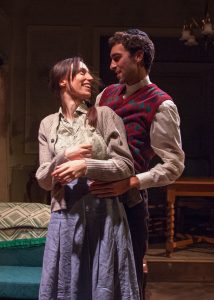 Exorcising the killing fields, Lusia must adjust to a new world called New York, a very different concentration camp full of Ginger Rogers celluloid fantasies and seemingly surreal appliances. Haunting her are memories of her ardent husband Duvid Pechenik (charismatic Alex Stein), her best friend Hanna (wonderful Sarah Wisterman), and of course their deeply but too briefly devoted mother.
Exorcising the killing fields, Lusia must adjust to a new world called New York, a very different concentration camp full of Ginger Rogers celluloid fantasies and seemingly surreal appliances. Haunting her are memories of her ardent husband Duvid Pechenik (charismatic Alex Stein), her best friend Hanna (wonderful Sarah Wisterman), and of course their deeply but too briefly devoted mother.
Rose must get to know, then learn to love, the sister she can’t remember, a still frightened young lady who clings to a porcelain doll. (Rose was 4 when her father took her to America on business and never returned.) Defensive over his inability to rescue his wife and daughter, their father stubbornly clings to Jehovah (“It was the will of God,†he piteously argues). But he melts enough to show Lusia his family album, snapshots that preserve a lost past. In a lovely moment, the sisters play at having a picnic: It’s so much late-blooming innocence, briefly invented to make up for lost time.
The play’s happy ending (which must not be disclosed even as it can be doubted, partly for its wishful thinking) can’t amount to closure. By now Lebow has been too honest in depicting the Weiss’s still-potent separation anxiety and regret-ridden recriminations. We know that these sisters will always be more or less strangers while hate, turned into history, has made their mother and so many others palpable ghosts.
The systematic slaughter of the Third Reich’s dozen years puts every subsequent moment of quiet kindness and hard-fought happiness in a searing perspective. But equally persistent is our dogged human nature: We want to believe — because the alternative is unthinkable — that good can come from evil. For what it’s worth — and that’s surprisingly much after 140 minutes — that happens to one shayna maidel.
photos by Lara Goetsch
A Shayna Maidel
TimeLine Theatre, 615 W. Wellington Ave.
Wed & Thurs at 7:30; Fri at 8; Sat at 4 & 8; Sun at 2
(check first for schedule variations)
ends on November 4, 2018
for tickets, call 773.281.8463 x 6 or visit Timeline
for more shows, visit Theatre in Chicago

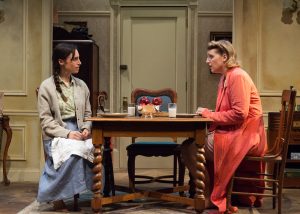
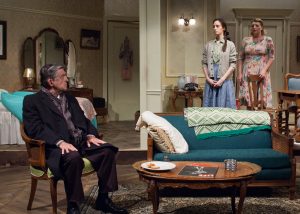
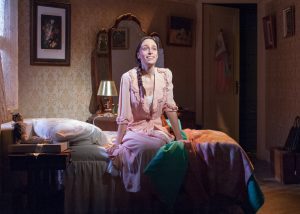
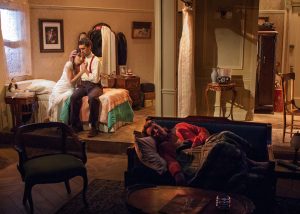


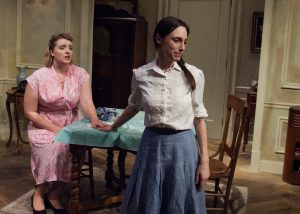

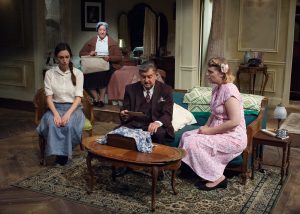
{ 1 comment… read it below or add one }
What a beautifully written piece. The first sentence is a gem I will not forget.